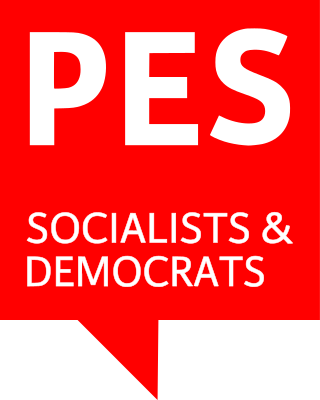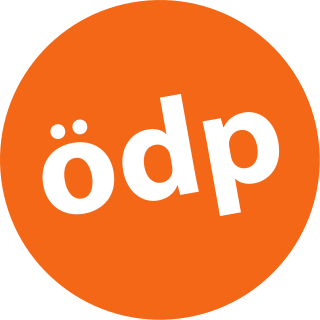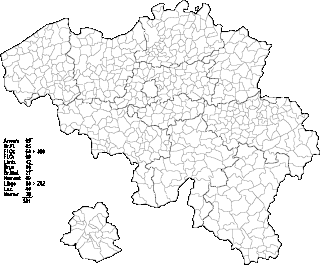
The Christian Social Union in Bavaria is a Christian democratic and conservative political party in Germany. Having a regionalist identity, the CSU operates only in Bavaria while its larger counterpart, the Christian Democratic Union (CDU), operates in the other fifteen states of Germany. It differs from the CDU by being somewhat more conservative in social matters, following Catholic social teaching. The CSU is considered the de facto successor of the Weimar-era Catholic Bavarian People's Party.
Luxembourg is a parliamentary representative democratic monarchy, whereby the prime minister is the head of government, and the multi-party system. Executive power is under the constitution of 1868, as amended, exercised by the government, by the grand duke and the Council of Government (cabinet), which consists of a prime minister and several other ministers. Usually, the prime minister is the leader of the political party or coalition of parties having the most seats in parliament. Legislative power is vested in both the government and parliament. The judiciary is independent of the executive and the legislature.

The Party of European Socialists (PES) is a social democratic European political party.

The politics of Belgium take place in the framework of a federal, representative democratic, constitutional monarchy. The King of the Belgians is the head of state, and the prime minister of Belgium is the head of government, in a multi-party system. Executive power is exercised by the government. Federal legislative power is vested in both the government and the two chambers of parliament, the Senate and the Chamber of Representatives. The federation is made up of (language-based) communities and (territorial) regions. Philippe is the seventh and current King of the Belgians, having ascended the throne on 21 July 2013.

The Austrian People's Party is a Christian-democratic and liberal-conservative political party in Austria.

The Christian Social People's Party is the largest political party in Luxembourg. The party follows a Christian democratic and conservative ideology and has been described as centre to centre-right. Furthermore, akin to most parties in Luxembourg, it is strongly pro-European. The CSV is a member of the Christian Group, European People's Party, and the Centrist Democrat International.

The Ecological Democratic Party is a green conservative and ecologist minor party in Germany. The ÖDP was founded in 1982.

The Landtag of Bavaria, officially known in English as the Bavarian State Parliament, is the unicameral legislature of the German state of Bavaria. The parliament meets in the Maximilianeum in Munich.
The Christian Social Party (CSP) (German: Christlich-soziale Partei, French: Parti chrétien-social) is a political party in Switzerland of the Christian left. The CSP is more aligned with social democracy than the other major Christian party, the Christian Democratic People's Party of Switzerland (CVP), which is more economically liberal. With the moderate Christian left as its background, the CSP commits itself to social-democratic and environmentalist political solutions. The core principles of the CSP contain, among others, "solidarity with the socially and economically disadvantaged and the preservation of the environment."

Die Partei für Arbeit, Rechtsstaat, Tierschutz, Elitenförderung und basisdemokratische Initiative, or Die PARTEI, is a German political party. It was founded in 2004 by the editors of the German satirical magazine Titanic. It is led by Martin Sonneborn. In the 2014 European Parliament election, the party won a seat, marking the first time that a satirical party has won a seat to the European Parliament. With the 2019 European Parliament election, the party gained a second seat, held by Nico Semsrott.

The Belgian provincial, municipal and district elections of 2000 took place on Sunday October 8, 2000. The electors elected the municipal councillors of 589 cities and towns as well as the ten provincial councils. Additionally, the newly established district councils in the city of Antwerp were elected for the first time.
The Christian Social Party was a right-wing political party in the German Empire founded in 1878 by Adolf Stoecker as the Christian Social Workers' Party.

The CDU Baden-Württemberg is the political party with the most members in the German state of Baden-Württemberg and the second largest state party of the Christian Democratic Union of Germany with almost 65,000 members. Its chairman is Manuel Hagel, who succeeded Thomas Strobl in 2023.

The German Social Union is a small conservative political party mainly active in the new states of Germany. It was founded in 1990 as a right-wing opposition group during the Wende transition to democracy in East Germany, when it was part of the Alliance for Germany electoral coalition. After 1990, it fell into insignificance, only holding a few seats on the local level.
The Christian Social Party of Liechtenstein was a political party in Liechtenstein active from 1962 to 1974.

The Party of German-speaking Belgians was a regionalist political party active in the German-speaking Community of Belgium founded in 1971. The party was a founder member of the European Free Alliance in 1981.
The Christian-Social People's Party, often shortened to People's Party, was a social liberal political party in Liechtenstein. Founded in 1918, the Christian-Social People's Party and the Progressive Citizens' Party (FBP) were the first political parties in Liechtenstein.
The Boerenbond is a professional association of farmers active in the Flemish and German-speaking communities of Belgium. Founded in 1890 and based in Leuven, the Boerenbond is an organisation promotes the interests of farmers working within its regions of activity and has historically been closely associated with Catholic political parties.
Alliance C – Christians for Germany is a Christian Conservative political party in Germany, which was established in 2015 as a result of the amalgamation of Partei Bibeltreuer Christen and the AUF - Partei für Arbeit, Umwelt und Familie. The party professes to adhere to the Apostles' Creed and the Old and New Testaments.













